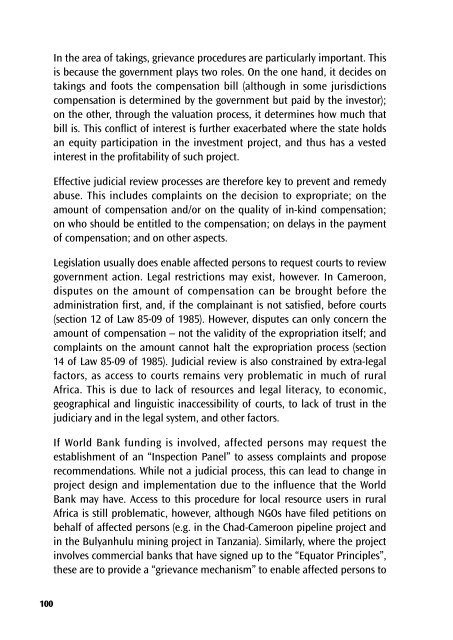Legal empowerment for local resource control
Legal empowerment for local resource control
Legal empowerment for local resource control
You also want an ePaper? Increase the reach of your titles
YUMPU automatically turns print PDFs into web optimized ePapers that Google loves.
100<br />
In the area of takings, grievance procedures are particularly important. This<br />
is because the government plays two roles. On the one hand, it decides on<br />
takings and foots the compensation bill (although in some jurisdictions<br />
compensation is determined by the government but paid by the investor);<br />
on the other, through the valuation process, it determines how much that<br />
bill is. This conflict of interest is further exacerbated where the state holds<br />
an equity participation in the investment project, and thus has a vested<br />
interest in the profitability of such project.<br />
Effective judicial review processes are there<strong>for</strong>e key to prevent and remedy<br />
abuse. This includes complaints on the decision to expropriate; on the<br />
amount of compensation and/or on the quality of in-kind compensation;<br />
on who should be entitled to the compensation; on delays in the payment<br />
of compensation; and on other aspects.<br />
Legislation usually does enable affected persons to request courts to review<br />
government action. <strong>Legal</strong> restrictions may exist, however. In Cameroon,<br />
disputes on the amount of compensation can be brought be<strong>for</strong>e the<br />
administration first, and, if the complainant is not satisfied, be<strong>for</strong>e courts<br />
(section 12 of Law 85-09 of 1985). However, disputes can only concern the<br />
amount of compensation – not the validity of the expropriation itself; and<br />
complaints on the amount cannot halt the expropriation process (section<br />
14 of Law 85-09 of 1985). Judicial review is also constrained by extra-legal<br />
factors, as access to courts remains very problematic in much of rural<br />
Africa. This is due to lack of <strong>resource</strong>s and legal literacy, to economic,<br />
geographical and linguistic inaccessibility of courts, to lack of trust in the<br />
judiciary and in the legal system, and other factors.<br />
If World Bank funding is involved, affected persons may request the<br />
establishment of an “Inspection Panel” to assess complaints and propose<br />
recommendations. While not a judicial process, this can lead to change in<br />
project design and implementation due to the influence that the World<br />
Bank may have. Access to this procedure <strong>for</strong> <strong>local</strong> <strong>resource</strong> users in rural<br />
Africa is still problematic, however, although NGOs have filed petitions on<br />
behalf of affected persons (e.g. in the Chad-Cameroon pipeline project and<br />
in the Bulyanhulu mining project in Tanzania). Similarly, where the project<br />
involves commercial banks that have signed up to the “Equator Principles”,<br />
these are to provide a “grievance mechanism” to enable affected persons to

















